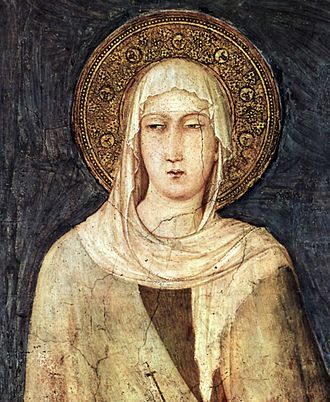
BENEDICT XVI
GENERAL AUDIENCE
Paul VI Hall
Wednesday, 15 September 2010
[Video]
Saint Clare of Assisi
Dear Brothers and Sisters,
One of the best loved Saints is without a doubt St Clare of Assisi who lived in the 13th century and was a contemporary of St Francis. Her testimony shows us how indebted the Church is to courageous women, full of faith like her, who can give a crucial impetus to the Church’s renewal.
So who was Clare of Assisi? To answer this question we possess reliable sources: not only the ancient biographies, such as that of Tommaso da Celano, but also the Proceedings of the cause of her canonization that the Pope promoted only a few month after Clare’s death and that contain the depositions of those who had lived a long time with her.
Born in 1193, Clare belonged to a wealthy, aristocratic family. She renounced her noble status and wealth to live in humility and poverty, adopting the lifestyle that Francis of Assisi recommended. Although her parents were planning a marriage for her with some important figure, as was then the custom, Clare, with a daring act inspired by her deep desire to follow Christ and her admiration for Francis, at the age of 18 left her family home and, in the company of a friend, Bona di Guelfuccio, made her way in secret to the Friars Minor at the little Church of the Portiuncula. It was the evening of Palm Sunday in 1211. In the general commotion, a highly symbolic act took place: while his companions lit torches, Francis cut off Clare’s hair and she put on a rough penitential habit. From that moment she had become the virgin bride of Christ, humble and poor, and she consecrated herself totally to him. Like Clare and her companions, down through history innumerable women have been fascinated by love for Christ which, with the beauty of his Divine Person, fills their hearts. And the entire Church, through the mystical nuptial vocation of consecrated virgins, appears what she will be for ever: the pure and beautiful Bride of Christ.
In one of the four letters that Clare sent to St Agnes of Prague the daughter of the King of Bohemia, who wished to follow in Christ’s footsteps, she speaks of Christ, her beloved Spouse, with nuptial words that may be surprising but are nevertheless moving: “When you have loved [him] you shall be chaste; when you have touched [him] you shall become purer; when you have accepted [him] you shall be a virgin. Whose power is stronger, whose generosity is more elevated, whose appearance more beautiful, whose love more tender, whose courtesy more gracious. In whose embrace you are already caught up; who has adorned your breast with precious stones… and placed on your head a golden crown as a sign [to all] of your holiness” (First Letter to Blessed Agnes of Prague: FF, 2862).
(To continue reading, please see here).
